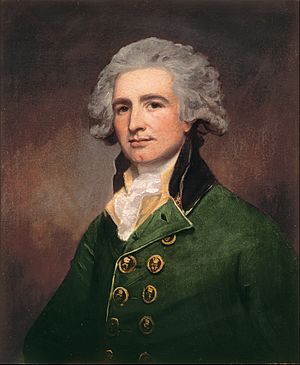Robert Abercromby of Airthrey facts for kids
Quick facts for kids
Robert Abercromby
GCB
|
|
|---|---|

Robert Abercromby painted in 1788 by George Romney
|
|
| Born | 21 October 1740 |
| Died | 3 November 1827 (aged 87) Airthrey |
| Allegiance | |
| Service/ |
British Army |
| Rank | General |
| Commands held | Bombay Army Indian Army |
| Battles/wars | French and Indian War American Revolutionary War Third Anglo-Mysore War |
| Awards | Knight Grand Cross of the Order of the Bath |
General Sir Robert Abercromby (born October 21, 1740 – died November 3, 1827) was a very important military leader. He was the younger brother of another famous general, Sir Ralph Abercromby. Robert Abercromby served as a general in the British Army.
He also held important positions in India. He was the Governor of Bombay and the top commander of the Bombay Army. Later, he became the Commander-in-Chief, India for the East India Company. Robert was the son of Professor George Abercromby.
Contents
Robert Abercromby's Military Career
Robert Abercromby started his military journey early. He fought in the French and Indian War. This war took place in North America. In 1761, he was promoted to a captain.
Fighting in the American Revolutionary War
Later, Robert Abercromby became a lieutenant colonel. This was in 1775. He played a big part in the American Revolutionary War. He fought in many major battles. These included the Battle of Long Island and the Battle of Brandywine.
He also fought at the Battle of Germantown and the Battle of Monmouth. He led a special group of soldiers called light infantry. He was also involved in the sieges of Charleston and Yorktown. At Yorktown, he commanded a large part of the British forces.
Service in India
After the war in America, Abercromby continued his service. He became a Colonel for life of the 75th (Highland) Regiment. This new regiment was created to protect British interests in India.
Abercromby served in India from 1790 to 1797. During this time, he held very important roles. He was the Governor of Bombay. He was also the Commander-in-Chief of the Bombay Army. From 1793, he became the overall Commander-in-Chief, India.
Later Life and Achievements
After his time in India, Robert Abercromby returned home. In 1798, he bought Airthrey Castle. This made him known as Abercromby of Airthrey.
He continued to rise in rank in the army. In 1797, he became a lieutenant-general. In 1802, he was promoted to a full general. He also became a member of Parliament (M.P.) in 1798. He represented the area of Clackmannan.
In 1801, he was made governor of Edinburgh Castle. This was an important position. He held this role until he passed away. Sadly, he started to lose his eyesight. This was due to an eye disease he got in India. Because of his blindness, he could no longer serve actively in the military. He also had to leave his position in Parliament in 1802.
 | Janet Taylor Pickett |
 | Synthia Saint James |
 | Howardena Pindell |
 | Faith Ringgold |

